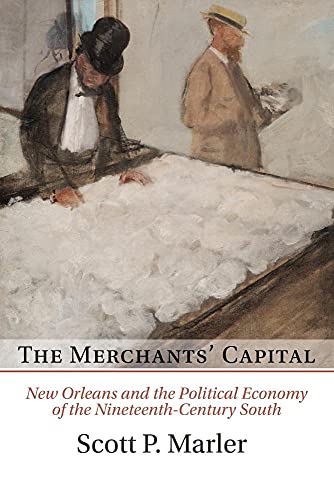Merchants' Capital : New Orleans and the Political Economy of the Nineteenth-century South


sku: COM9781107557543USED
ACCORDING TO OUR RECORDS THIS PRODUCT IS NOT AVAILABLE NOW
$24.13
Shipping from: Canada
Description
As cotton production shifted toward the southwestern states during the first half of the nineteenth century, New Orleans became increasingly important to the South's plantation economy. Handling the city's wide-ranging commerce was a globally oriented business community that represented a qualitatively unique form of wealth accumulation - merchant capital - that was based on the extraction of profit from exchange processes. However, like the slave-based mode of production with which they were allied, New Orleans merchants faced growing pressures during the antebellum era. Their complacent failure to improve the port's infrastructure or invest in manufacturing left them vulnerable to competition from the fast-developing industrial economy of the North, weaknesses that were fatally exposed during the Civil War and Reconstruction. Changes to regional and national economic structures after the Union victory prevented New Orleans from recovering its commercial dominance, and the former first-rank American city quickly devolved into a notorious site of political corruption and endemic poverty.
Price history chart & currency exchange rate







![Political Anatomy of the Body: Medical Knowledge in Britain in the Twentieth Century [first edition]
Political Anatomy of the Body: Medical Knowledge in Britain in the Twentieth Century [first edition]](http://pictures.abebooks.com/isbn/9780521247467-us.jpg)

![Native Lords of Quito in the Age of the Incas. the Political Economy of North Andean Chiefdoms [first edition]
Native Lords of Quito in the Age of the Incas. the Political Economy of North Andean Chiefdoms [first edition]](http://pictures.abebooks.com/isbn/9780521302999-us.jpg)





![The Cultural Meaning of Popular Science: Phrenology and the Organization of Consent in Nineteenth Century Britain [first edition]
The Cultural Meaning of Popular Science: Phrenology and the Organization of Consent in Nineteenth Century Britain [first edition]](http://pictures.abebooks.com/isbn/9780521227438-us.jpg)







![Inventing the Israelite: Jewish Fiction in Nineteenth-Century France (Stanford Studies in Jewish History and Culture) [Hardcover ]
Inventing the Israelite: Jewish Fiction in Nineteenth-Century France (Stanford Studies in Jewish History and Culture) [Hardcover ]](http://pictures.abebooks.com/isbn/9780804763844-us.jpg)











